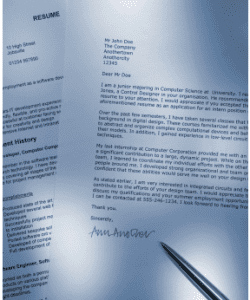 Some will tell you that nobody reads cover letters any more, so there’s no good reason to write them. But there actually are very good reasons to write a professional, researched, compelling cover letter, and here’s the top reason why:
Some will tell you that nobody reads cover letters any more, so there’s no good reason to write them. But there actually are very good reasons to write a professional, researched, compelling cover letter, and here’s the top reason why:
It is your opening argument that the attached resume is worth taking the time to read.
There are many helpful hints on writing your cover letter and it is a good idea to read up on this skill before you start drafting yours. Then start by taking the specific job description you are applying for and matching your qualifications to that description. Find the company’s goals and mission statement. Can you see how they mesh with the job and how you could be the best candidate for that opening?
If possible, discover who will be reading the resumes and use their name in the opening. Present your case for their consideration by a well-written and concise explanation of how your qualifications fit their needs and their goals. Reference any personal recommendations you have within the organization. Think of who will read your letter, what their goals are, and how to show them you can be the one to meet those goals.
An opening argument isn’t the entire database of evidence in a debate; it is the distillation of that evidence in a simple form that communicates conviction of opinion. Or to put it another way, it is the advertising copy that gets the buyer interested in looking at the product more closely. If that advertising is full of grammar mistakes and spelling errors, the product is seen as jokeworthy and will probably be rejected.
In the same way, if your cover letter is full of grammar mistakes and spelling errors, your resume will probably be rejected without being read because it will be assumed that your standards are lower than the reader’s. If you know you make grammar and spelling mistakes, use all the tools at your disposal to correct them. Computer programs like spellcheck and grammar checks are helpful, but a person will catch things they miss. Ask a friend who cares about writing well to proofread your cover letter. If you lack a friend with those skills, use a service like our Resume Critique and get a professional opinion.
Cover letters can convince a potential employer to consider a resume they might ignore otherwise. And that is a good reason to write one!
This guest post is by Erin Kennedy, MCD, CMRW, CPRW, BS/HR, a Certified Professional & Executive Resume Writer/Career Consultant, and the President of Professional Resume Services, Inc. She has achieved international recognition following nominations and wins of the prestigious T.O.R.I. (Toast of the Resume Industry) Award. Find Erin at http://exclusive-executive-resumes.com.
